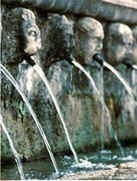Biting the Lead Bullet
The element lead has had an important relationship with air pollution from use of the petrol additive called tetraethyl lead as an “anti-knock” agent. That issue has long since gone away but lead in our environment has not as clear from the recent warnings about using lead piping for water supply in some homes in Ireland
In 2014 Irish Water announced that up to 140,000 of their customers are drawing their household supplies through lead pipes, and that it would take 10 years and up to €300m to replace them. This estimate of affected households rose in June 2015 to 200,000 as a result of their national metering programme. For homeowners the majority of individual households will have to foot the bills for replacement with modern materials like PVC pipes leading to costs that might reach or exceed about €3,000.
The Government response was to set up a means-tested grant scheme that would provide up to €4000 for affected households. The reason for taking this action is that the word “lead” is immediately identified with adverse health impacts on humans, especially babies.
Lead piping, of course, has been used for water piping to buildings since Roman Times, when it replaced clay as a material of choice. The Romans did not know much Chemistry though, even though they inadvertently gave us the word plumbing because their word for lead metal was plumbum. And Chemistry has a great deal to do with this water contamination issue because it gives all householders an important perspective on the issues they face in the road or street that they live in.
So why is Chemistry important? Many of you will switch off at this point because you hated the subject at school. But try to think of the building blocks (or elements) of chemistry as being parts of a mixed Lego/Duplo set that has more than 100 different pieces of differing shapes, sizes and colours. Some of them are gases, some liquids and some are solids like lead. Some can click together (bond or react) and others cannot. Those that can bond/react together do so by the transfer of very small electric charges scientists call electrons and the new chemicals made are called ions or molecules or radicals.
Lead is an element that can become ionized if it encounters acidity, in other words hydrogen ions in a form chemists term hydrogen ions (H+) or, if they have bonded to a water molecule, a hydroxonium ion (H2OH+). Either of these can react with metallic lead to ionize it to a form that dissolves in water. The resulting solutions are much more easily ingested, digested and reactive in our bodies and damage some of the biochemicals that we are made from. The amount of acidity that the lead pipes encounter depend upon the location the householders live in and, to a large extent, whether or not they have a so-called “hard water” or “soft water” supply or use water “softeners” to extend the lifetime of the plumbing.
About 60% of Ireland has a hard water supply. This means that the water has many natural minerals inside it capable of reacting with the lead to form insoluble materials like lead carbonates, which end up coating the water pipes. (If you live in Dublin you will surely have encountered limescale in shower heads or kettles: it is exactly the same phenomenon but with calcium or magnesium metals rather than lead). In soft water areas (less minerals and so less competition for acid attack on lead) or regions with naturally greater acidity that chemists call low pH conditions, the lead is much more soluble and therefore becomes more readily bioavailable.
So householders with lead pipes (if you’re sure or even unsure) should first check with Irish Water to see what type of supply they have. Then they should certainly do a simple chemical, home test on the lead levels that come out of their drinking water taps and, preferably, get a test from an accredited analyst. It is likely less than €100 to do so.
There is a very low limit on lead levels for human safety purposes (a ratio of 10 parts to every billion water parts by volume). If you exceed that limit you should bite the bullet for lead pipe replacement as soon as possible. If not then you have no need to panic but for peace of mind I would, in any case, take advantage of the Government grant scheme and install PVC piping.
Professor John Sodeau
Department of Chemistry and Environmental Research Institute
University College Cork
